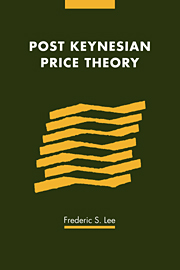Book contents
- Frontmatter
- Contents
- List of figures and tables
- Acknowledgments
- Introduction
- Part I The doctrine of administered prices
- Part II The doctrine of normal cost prices
- Part III The doctrine of mark up prices
- 7 The origin of the doctrine of mark up prices: Michal Kalecki's microanalysis
- 8 Kalecki's microanalysis and the war years
- 9 Kalecki and the Cambridge contributions
- 10 Josef Steindl and the stagnation thesis
- Part IV The grounded pricing foundation of Post Keynesian price theory
- Appendix A Studies on cost accounting and costing practices
- Appendix B Studies on pricing
- Bibliography
- Index
10 - Josef Steindl and the stagnation thesis
Published online by Cambridge University Press: 22 September 2009
- Frontmatter
- Contents
- List of figures and tables
- Acknowledgments
- Introduction
- Part I The doctrine of administered prices
- Part II The doctrine of normal cost prices
- Part III The doctrine of mark up prices
- 7 The origin of the doctrine of mark up prices: Michal Kalecki's microanalysis
- 8 Kalecki's microanalysis and the war years
- 9 Kalecki and the Cambridge contributions
- 10 Josef Steindl and the stagnation thesis
- Part IV The grounded pricing foundation of Post Keynesian price theory
- Appendix A Studies on cost accounting and costing practices
- Appendix B Studies on pricing
- Bibliography
- Index
Summary
Before leaving Oxford, Kalecki suggested to Steindl that he examine the puzzle as to why capitalism ceased to function in the inter-war period. Steindl took up the suggestion and after completing Small and Big Business (1945b) turned his attention to the puzzle. In particular, he sought to contribute to the mature economy controversy initiated by Alvin Hansen through a concrete examination of the rise, decline, and eventual stagnation of capital accumulation in the American economy from 1869 to 1939. Believing that the explanation of economic stagnation required the articulation of a long-term theory of growth, Steindl developed Kalecki's theory of investment into a theory of growth centered on the propensity of entrepreneurs to invest, where this propensity was a function of past savings, relative indebtedness, and the degree of capacity utilization. Furthermore, he argued that the degree of capacity utilization was dependent on the magnitude of net profit margins vis-à-vis the given level of investment. Steindl therefore began his investigation by examining the forces which determined the net profit margin. The outcome of this work was a microanalysis of the net profit margin, which was completed by 1947. He then turned his attention to developing his theory of growth based on this microanalysis, which was completed in 1949. The completed manuscript was sent to the printers in January 1950, but the printing of Maturity and Stagnation in American Capitalism was delayed until 1952.
- Type
- Chapter
- Information
- Post Keynesian Price Theory , pp. 186 - 198Publisher: Cambridge University PressPrint publication year: 1999
- 1
- Cited by



